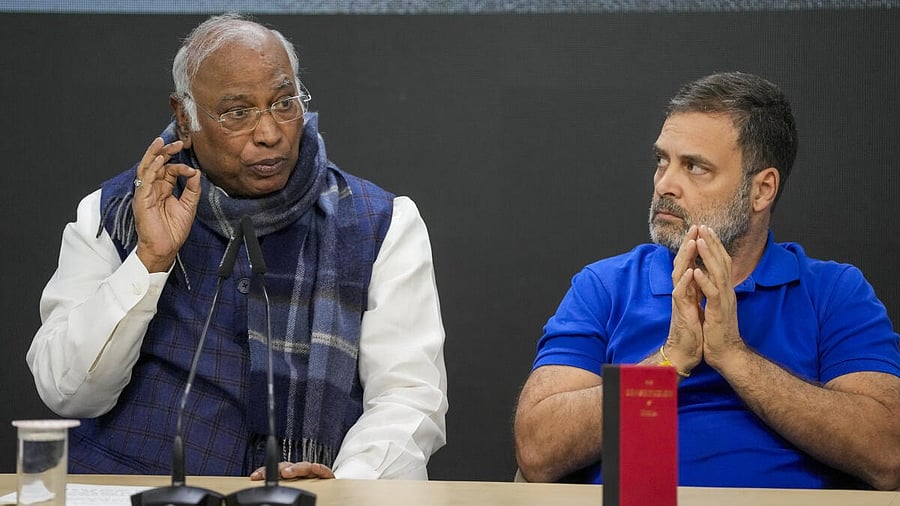
Congress President Mallikarjun Kharge with LoP in the Lok Sabha and party MP Rahul Gandhi.
Credit: PTI Photo
New Delhi: Leaders of Opposition Mallikarjun Kharge and Rahul Gandhi had raised objections over the “fundamentally flawed” and a “predetermined” exercise to choose NHRC Chairman, and members, and had suggested the names of retired Justices Rohinton Fali Nariman and Justice KM Joseph for the top post in the rights body, their dissent note shows.
They also suggested the names of Justices S Muralidhar and Akil Qureshi for the posts of NHRC members, arguing that “maintaining a balance that reflects the regional, caste, community, and religious diversity” is “equally important” while merit undeniably remains the primary criterion.
They submitted a joint dissent note at a meeting of the Selection Committee chaired by Prime Minister Narendra Modi on December 18, condemning the “dismissive approach” adopted by the “majority of the Selection Committee” towards their suggestions, which they said was “deeply regrettable”.
In their two-page dissent note, Kharge and Rahul said the meeting was a “pre-determined exercise that ignored the established tradition of mutual consultation and consensus” and this departure undermined the principles of fairness and impartiality, which are critical to the credibility of the Selection Committee.
“Instead of fostering deliberation and ensuring a collective decision, the committee relied on its numerical majority to finalise the names, disregarding the legitimate concerns and perspectives raised during the meeting,” they said.
Arguing that NHRC's ability to fulfil its mandate safeguarding the fundamental rights of all citizens depends significantly on the inclusiveness and representativeness of its composition, they proposed the names of Justices Nariman and Joseph for the position of Chairperson, “keeping in mind both merit and the need for inclusivity”.
They said the inclusion of Justice Nariman, a distinguished jurist from the minority Parsi community known for his intellectual depth and unwavering commitment to constitutional values, would send a strong message about the NHRC's dedication to representing India's pluralistic society.
Justice Joseph, also a former Supreme Court judge belonging to the minority Christian community, has consistently delivered judgments that emphasise individual freedoms and the protection of marginalised groups, “making him an ideal candidate for this critical position”, they said.
For NHRC members, they highlighted Justice Muralidhar’s landmark judgments advancing social justice, including his work on custodial violence and the protection of civil liberties. They said Justice Qureshi, belonging to the Muslim community, has consistently defended constitutional principles and demonstrated a strong commitment to accountability in governance.
Their inclusion would contribute to the NHRC's effectiveness and its commitment to diversity, the leaders said.
By neglecting the critical principle of balance, they warned, the committee risks eroding public trust in this esteemed institution.
Besides the Prime Minister and two Leaders of Opposition, the Home Minister, Lok Sabha Speaker and Rajya Sabha Deputy Chairman are also members.
On Monday, former Supreme Court judge Justice V Ramasubramanian was appointed the new chairperson of the National Human Rights Commission, a post that had been lying vacant since Justice Arun Kumar Mishra completed his tenure on June 1. Justice Bidyut Ranjan Sarangi and Priyank Kanoongo were named as members.
DH had on December 19 reported that the Leaders of Opposition had objected to the appointments and would be submitting a dissent note.
“Lastly, the dismissive approach adopted by the majority of the Selection Committee in today's meeting towards these considerations is deeply regrettable. The NHRC's credibility and effectiveness depend on its ability to embody the diversity and inclusiveness that define India's constitutional ethos,” the dissent note given on December 18 said.
“The names we proposed reflect this spirit and align with the foundational principles of the commission. Their exclusion raises significant concerns about the impartiality and fairness of the selection process,” Kharge and Gandhi said.
